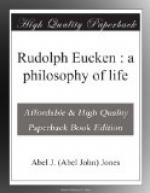What shall he do? Must he once again leave the realistic systems of Naturalism, Socialism, and Individualism, and return to the older systems of Religion and Idealism? Was he not wrong in giving up the thought of a higher invisible world? Has not the restriction of life to the visible world robbed life of its greatness and dignity? This it certainly has done, and there is little wonder that the soul of mankind is already revolting, and shows a tendency once again to look towards religion and idealism for a solution of life.
But the educated mind can never again take up exactly the same position as it once did in regard to religion and idealism. The great realistic theories have made too great a change in the standard of life, and in man himself, to make it possible for him to revert simply to the old conditions, and the older orthodox doctrines of religion can never again be accepted as a mere matter of course. But the great question has again come to the forefront—is there a higher world, or is the fundamental truth of religion a mere illusion? This is the question that calls for answer to-day, an answer which must be different, as man is different, from the answers that were given in the past. A satisfactory answer is impossible without understanding clearly the relation between the Old and the New, and without taking account of the great, if partial, truths that the realistic schemes of life have taught mankind.
To accept unreservedly Naturalism, Socialism, and Individualism is impossible, for these rob life of its deeper meaning. To return to the older doctrines without reserve is equally impossible.
Shall we ignore the question? This would be a fatal mistake. Some throw themselves into the rush of work, and endeavour to forget the deeper problems of life—but “the result is a life all froth and shimmer, lacking inward sincerity, a life that can never in itself satisfy them, but only keep up the appearance of doing so.” There must be some decision; for is not society being more and more broken up into small sections, possessing the most variable standards of life, and evaluating things in a diversity of ways? Such an inward schism must weaken any effort on the part of humanity to combine for ideal ends. Perhaps he of narrow vision, who sees nothing in life but sensuous pleasure, is happy—but it is the happiness of the lower world. Perhaps, too, he of the superficial mind is happy, who sees no deep contradictions in the solutions offered, and is prepared to accept one to-day and another tomorrow—but his happiness is that of the feeble mind.
What then can be done? Shall we despair? Never! The question is far too urgent. To despair is to accept a policy that spells disaster to the human race. The immediate environment is powerless to give life any real meaning. We must probe deeper into the eternal—and it is from such investigations that Eucken outlines a new theory of life.




